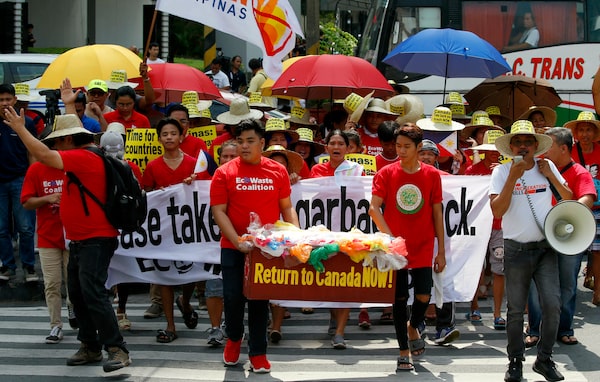
Environmentalists march outside the Canadian Embassy to demand the Canadian government speed up the removal of several containers of garbage that were shipped to the country, on May 21, 2019.Bullit Marquez/The Associated Press
The federal government has hired a private company to bring tonnes of mouldering Canadian garbage back to Canada from the Philippines after Philippine President Rodrigo Duterte said he was ready to “declare war” over the trash.
In a statement Wednesday, Environment Minister Catherine McKenna announced the government had awarded a contract to Bolloré Logistics Canada to bring truckloads of mixed waste, including adult diapers, back to Canada. The company will prepare shipping containers in the coming days, and the garbage will be removed from the Philippines by the end of June. Ottawa will pay the company more than $1.1-million to cover the costs of the preparation, transfer, shipment and disposal of the waste.
“Canada values its deep and long-standing relationship with the Philippines and has been working closely with Filipino authorities to find a solution that is mutually acceptable,’ Ms. McKenna said. "Canada is pleased to announce that it has awarded a contract to bring the waste back promptly and to ensure its safe and environmentally sound disposal.”
The announcement came hours after Mr. Duterte’s spokesman held a news conference to announce that Filipino officials had been ordered to look for a private shipping company to transport the garbage to Canadian territory. Salvador Panelo said the Philippines would cover the cost of the shipment.
"The Filipino people are gravely insulted about Canada treating this country as a dumpsite,” Mr. Panelo said.
However, it was unclear why the Philippines announced plans to hire a company when Canada intended to do so. Ms. McKenna’s office said Manila was made aware of Canada’s decision to hire Bolloré Logistics Canada before the contract was announced. The Philippines Department of Foreign Affairs did not respond to a request for comment.
Last week, the Philippines escalated the garbage dispute by recalling its ambassador and consulate heads when Ottawa failed to meet a May 15 deadline, imposed by Mr. Duterte, to remove the garbage.
The dispute began when a Canadian company sent 103 mislabelled containers, which were supposed to contain recyclable plastic, to the Manila International Container Terminal more than five years ago. Filipino authorities discovered mixed waste in the containers, including household garbage and used adult diapers, and Manila has since demanded Canada take the garbage back.
The contents of 34 of the containers were eventually disposed of by the Philippines, but 69 remain in Manila.
Ms. McKenna said the government is looking to hold Whitby, Ont.-based plastics exporter Chronic Inc., which the government says is now out of business, to account.
Foreign Affairs Minister Chrystia Freeland said Canada has been in continuous contact with Manila about the matter.
"I was pleased to speak with my counterpart, Secretary of Foreign Affairs Teodoro Locsin, last week to reiterate Canada’s firm commitment to promptly repatriate the waste to Canada,” Ms. Freeland said in a statement Wednesday.
The garbage arrived in Manila while the Conservatives were in power, but Prime Minister Justin Trudeau has been forced to deal with the matter. Asked about the garbage during visits to Manila in 2015 and 2017, he said he couldn’t do anything about it because it was a private commercial transaction.
The Pacific Centre for Environmental Law and Litigation, a legal non-profit group, recently produced a legal opinion saying Canada violated the Basel Convention, which controls the international trade and disposal of hazardous goods, by failing to take back the garbage. Anthony Ho, an associate at the Pacific Centre, said Canada’s slow response has environmental activists baffled.
“The question really was why did it take so long, particularly when our federal government was elected to power on an agenda of advancing environmental issues?" Mr. Ho said.
Earlier this month, Canada and 186 other countries agreed to amend the Basel Convention to reduce the amount of plastic in the oceans and force developed countries to deal with their own garbage instead of exporting it.
With files from the Associated Press